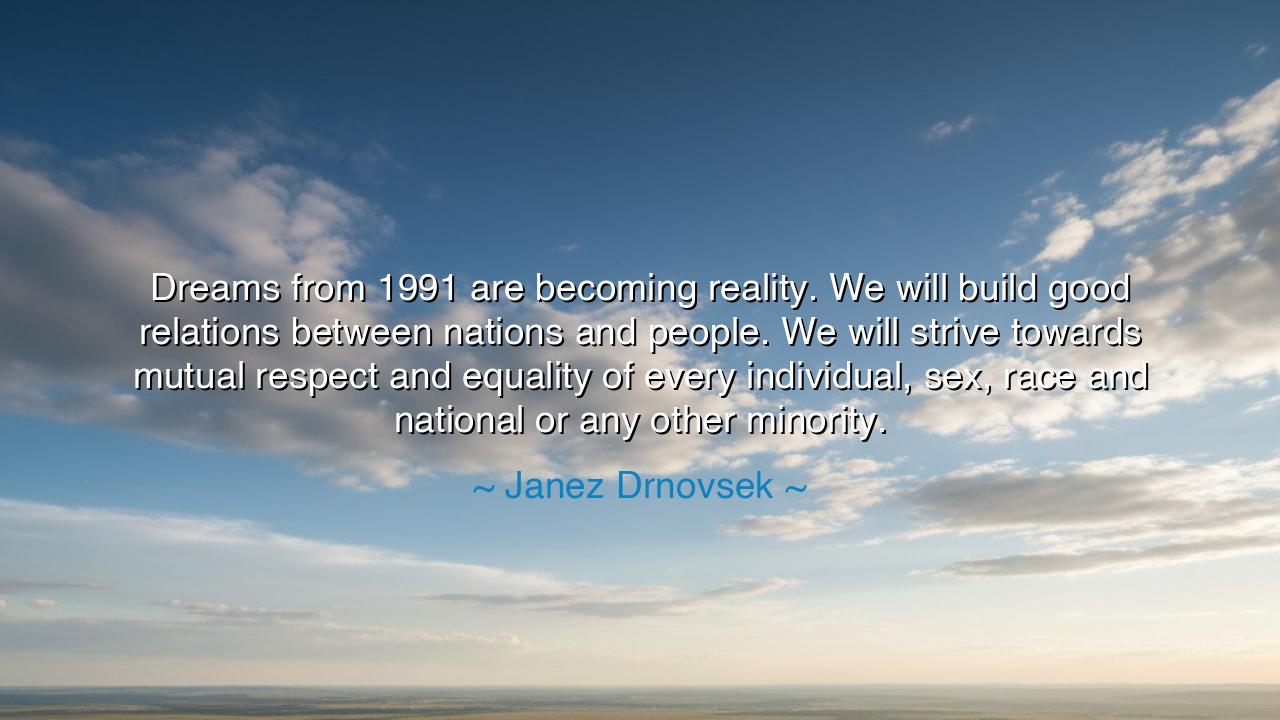
Dreams from 1991 are becoming reality. We will build good
Dreams from 1991 are becoming reality. We will build good relations between nations and people. We will strive towards mutual respect and equality of every individual, sex, race and national or any other minority.






In the noble and visionary words of Janez Drnovšek, former President and Prime Minister of Slovenia, we hear the triumphant song of a people emerging from the shadows of division into the light of unity: “Dreams from 1991 are becoming reality. We will build good relations between nations and people. We will strive towards mutual respect and equality of every individual, sex, race, and national or any other minority.” These words, uttered in the spirit of hope and renewal, rise like a hymn to human progress. They speak not only to a moment in history, but to the eternal labor of humankind—to the task of building bridges where there were once walls, and sowing peace where once there was pain.
The origin of this quote lies in the dawn of Slovenia’s independence in 1991, when a small nation dared to dream of freedom amid the crumbling of Yugoslavia. It was a time of uncertainty and courage, when the world was shifting and the people of Slovenia reached for sovereignty through conviction rather than conquest. Years later, Drnovšek spoke these words to remind his people—and all nations—that the dreams born in struggle must be guarded through compassion, mutual respect, and equality. His declaration was not merely political; it was spiritual, a vow that independence should not lead to isolation, and liberty should not give birth to arrogance.
To understand his meaning, one must look to the deep wisdom that courses through the ages: that peace is not the absence of war, but the presence of justice. The ancients knew this truth well. When Ashoka the Great, the emperor of India, stood upon the battlefield of Kalinga and beheld the cost of conquest, his heart turned from blood to compassion. He declared that true victory lay not in the sword, but in the heart. So too did Drnovšek, in his modern age, call upon his people to pursue the victories of peace—to build “good relations between nations and people,” to strive for harmony that is not imposed by force but chosen through empathy.
Drnovšek’s vision reaches beyond the borders of Slovenia, beyond Europe, into the shared destiny of humankind. When he speaks of equality of every individual, regardless of sex, race, or nation, he echoes the eternal voice of humanity’s prophets and philosophers. From the Stoics who proclaimed the brotherhood of all souls to the reformers who fought for the rights of women and minorities, this principle has been humanity’s moral compass. Drnovšek’s words remind us that history’s highest dream is not dominance but dignity—that the true mark of civilization lies in how it treats its most vulnerable.
Consider the tale of Nelson Mandela, who, after twenty-seven years of imprisonment, emerged not with vengeance in his heart but with a dream of reconciliation. He believed that a nation could only heal through understanding, that no freedom was complete until all were free. Like Mandela, Drnovšek envisioned a society built not on triumph over others, but on shared respect. He called for a world in which nations, large and small, could look upon one another not as rivals but as companions in the grand journey of existence. His words remind us that greatness lies not in conquest, but in cooperation.
And yet, his quote also carries a gentle warning. For dreams, once realized, can easily fade if they are not tended. The dreams of 1991, as Drnovšek called them, were not the end but the beginning of a long pilgrimage. Mutual respect and equality are not gifts granted once—they must be cultivated daily in the hearts of individuals and nations alike. As the ancients would say, the tree of peace must be watered by deeds, not words. It is built through the courage to listen, to forgive, and to protect the rights of others, even when doing so demands sacrifice.
The lesson, then, is timeless and clear: dreams must become duties. To live by Drnovšek’s vision is to commit oneself to the quiet, steadfast work of building understanding in every sphere of life. In our homes, let there be respect; in our workplaces, fairness; in our nations, justice. Each act of kindness, each word of tolerance, is a stone laid in the foundation of the better world he described. We cannot all be presidents, but we can all be peacemakers in our own measure.
So let his words be remembered as both prophecy and promise: that the dreams of yesterday can indeed become the realities of tomorrow, if only we choose to see every person—every race, every nation, every minority—as part of our shared human family. For as Drnovšek knew, and as all the wise have known since the dawn of time, peace is not inherited—it is created. And those who dare to create it, in their hearts and in their nations, become the true builders of civilization.






AAdministratorAdministrator
Welcome, honored guests. Please leave a comment, we will respond soon